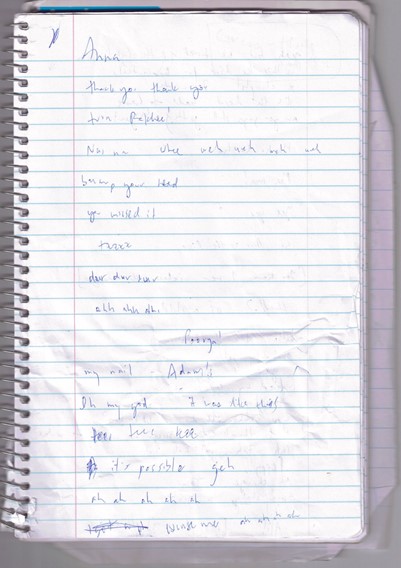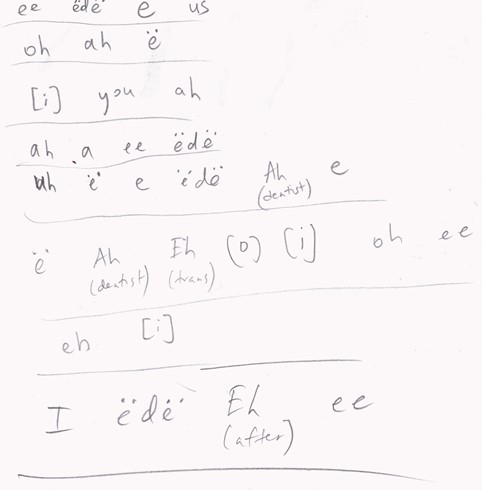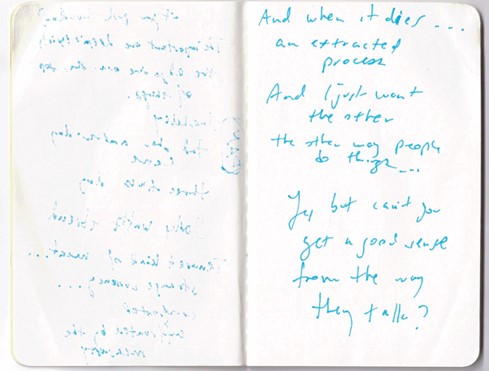by Ami Xherro
While language is instrumentalized in all facets of life, the hegemonic knots formed by a major language like English offer rich possibilities in deforming and deconstructing it. One way of doing so is through translation. When I begin to think of translation as a refractive prism of language, it becomes a listening form. Translational praxis becomes a practice of listening where no conversation is privileged to a subject. Louis Wolfson, the French schizo-linguist introduced to greater audiences by Gilles Deleuze, had such a revulsion to his mother tongue (and mother) that upon hearing or reading any word in English, he instantly and homophonically translated the words that crossed him into French, German, Hebrew and Russian. For Wolfson, listening carried with it a danger so grave that he had to divest himself from his inheritance altogether.
The act of listening hems the outer limit of the body with that which is beyond it, but which can still be indistinctly heard, and which still affects the body, unconsciously.
The following are four exercises in experimental translation grounded in listening. They are attempts at withdrawing from the imperative of meaning in communication and insisting rather that meaning is always swimming somewhere across the legible surface of words. More importantly, they are practices of delaying the sensible territories of the body to explore the insensibilities that surround it.
1. Transcription: All things have an interior language
I sit in a public place, alone or with a friend. I bring a notebook and a pen. I write down what I hear. Under ordinary circumstances, a flea market – that consists of diverse, multilingual groups, where languages are exchanged as effectively as currency – is a good idea. In current circumstances, I can play three YouTube videos at the same time, or sit in the parking lot of a grocery store. Part of the consideration when transcribing what I hear will be positioning; for example, a sidewalk curb may consist of the perfect elevation to catch baby crying in the car seat, or daddy piling toilet paper into the trunk. I am under the influence of Nothing escapes me. Everything refers me back to me: I am “above all the unity of a diversity that its unity does not reabsorb” (Jean-Luc Nancy, Listening). This is perhaps subjectless listening, and is “above all the unity of a diversity that its unity does not reabsorb”.
This is primarily an exercise in listening. I remember that in identifying, naming, and renaming sounds, I am not acting as a free agent. I am acted upon. Aristotle says sensing is perception, and sensation is first and foremost the sensing of oneself. This exercise in refracted publics, in the dissolution of authorship in composition is an apt reminder that translation is first and foremost a relation. There is an essential collectivity formed by listening which extends to everything indiscriminately. Written systems do not escape this. How to listen together = how to write together = how to be together. Edouard Glissant reminds us, “Relation is spoken multilingually. Going beyond the impositions of economic forces and cultural pressures, Relation rightfully opposes the totalitarianism of a monolingual intent.”
Once I am finished transcribing, I find an audience and perform what I’ve gathered. I perform and the audience appears.
2. Vowels out
Vowels are the timeslots of the imagination: in the closing mouth there is a wind of uncertainty: the vowel. It can be elided or it can be elongated. It decides the syllable which decides the meter. Much is to be found there: a sigh of relief or regret, the voluptuousness of fulfilled desire, the veiled fuckwish, or the juice of the near-knowable. The non-fixity of the vowel, the emptiness which gives way to radical possibility seeps into the word, into the space where the word dissipates.
Choose a poem. For example, I choose “Musselheap”, from Breathturn into Timestead, the collected later poetry of Paul Celan, translated by Pierre Joris.
From here, we break down the text into just its vowels, and decide on a way to annotate them:
Here, it can be said that the poem retains only its vowels; that the poem, now condensed into its radical potential, more readily reveals that which we may call its interior language, or its unconscious.
Here it is recorded underwater:
3. Broken telephone: room to room: sound stretch over object: figment
Set up a Zoom call with your friends. You preferably want an even number of participants, including yourself. At least 6 participants is the ideal number. Create pairs. Half of the participants will speak at the same time for 2.5 minutes while each non-speaker listens and records using a pen and paper the sounds emerging from the speaker they are paired with. Record what you hear being said, emanating from this one person. Then, switch. Read your individual records, or scripts, as a dialogue: this can take the form of an argument, a conversation, a lover’s quarrel, an extended monologue interspersed with objections, etc.
Here is my script:
4. Ghostwriting
Jack Spicer’s After Lorca was composed of loose (read: looooooooose) translations and imitations of Federico Garcia Lorca’s poems, which were supposedly dictated to him by Martians! Spicer wrote many letters to Lorca describing his translational praxis, to which Lorca – twenty years after his death – replied rather unsympathetically, claiming that Spicer’s project could hardly count as translation, as less than half of each line corresponded with Lorca’s work, and was mostly Spicer’s own meanderings.
In one letter, Spicer writes,
When I translate one of your poems and I come across words I do not understand, I always guess at their meanings. I am inevitably right. A really perfect poem (no one yet has written one) could be perfectly translated by a person who did not know one word of the language it was written in. A really perfect poem has an infinitely small vocabulary.
In his exasperated final letter, Spicer:
This is the last letter. The connection between us, which had been fading away with the summer, is now finally broken. I turn in anger and dissatisfaction to the things of my life and you return, a disembodied but contagious spirit, to the printed page. It is over, this intimate communion with the ghost of Garcia Lorca, and I wonder now how it was ever able to happen.
Saying goodbye to a ghost is more final than saying goodbye to a lover. Even the dead return, but a ghost, once loved, departing will never reappear. (Spicer, My Vocabulary Did This to Me)
Spicer’s translational praxis as a kind of ghostwriting was presaged by a questionnaire he drafted for a workshop in San Francisco in the late 50s called “Poetry as Magic”. In it he asks aspiring workshop participants a question such as:
Which one of these figures had or represented religious views nearest to your own religious views? Which furthest? Jesus, Emperor Julian, Diogenes, Buddha, Confucius, Marcus Aurelius, Lao Tse, Socrates, Dionysus, Apollo, Hermes Trismegistus, Li Po, Heraclitus, Epicurus, Apollonius of Tyana, Simon Magus, Zoroaster, Mohammed, Cicero.
Nearest __________. Furthest __________.
In another part of the questionnaire, he asks participants to fill in the blanks with any number of words to make a “complete and satisfactory poem” without changing any of the existing words or punctuation or the number of lines.
For the first exercise, I will write as the figure who represents my religious views – Confucius – to complete the following “poem” which I transcribed from a thrift store near my house (Value Village in Toronto) on March 17, 2021.
|
we all ____ to do ____ that means ____ ready ____ as team ____ keep to ____ please do ____ with your fellow ____ ____ half of ____ and our ____, the heroes ____ all ____ in our store today ____ require all ____ wear cover ____ or face ____ |
we all exist to do it that means non- ready eternity as team does keep to doing please do dull with your fellow thumbprints lower half of us and our dust, the heroes sleep all birthdays in our store today observable require all light wear cover whom or face concern. |








